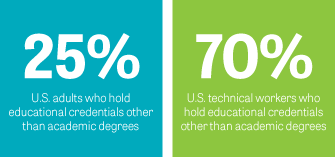TD Magazine Article
Alternative Routes to Education
A recent report from the U.S. Census Bureau shows that one-quarter of U.S. adults possess educational credentials other than an academic degree.
Tue Apr 08 2014

A recent report from the U.S. Census Bureau shows that one-quarter of U.S. adults possess educational credentials other than an academic degree. These credentials can include professional certifications, licenses, and educational certificates.
"Getting an academic degree is not the only way for people to develop skills that pay off in the labor market," says Stephanie Ewert, a demographer with the Census Bureau's Education and Social Stratification Branch and co-author of the report.
This is the first time alternative education credentials in the United States have been measured by the Census Bureau. The report shows that these credentials can lead to higher earnings and that, generally, the likelihood of having them rises with the level of degree obtained. Thirty-three percent of adults with bachelor's degrees have other education credentials, along with 48 percent of adults with master's degrees and 68 percent of those with a professional degree.
"For people with at least a bachelor's degree, earnings didn't really differ between those with an alternative educational credential and those without," says report co-author Robert Kominski. "But at lower levels of regular education, there is routinely an earnings premium for a professional certification or license, or an educational certificate."
The fields in which these credentials were obtained were wide-ranging, including nursing, education, business management, culinary arts, and cosmetology. The report found that 70 percent of those working in technical occupations have an alternative credential, and that 82 percent of those with an education credential earned it from some type of education institution.
You've Reached ATD Member-only Content
Become an ATD member to continue
Already a member?Sign In
